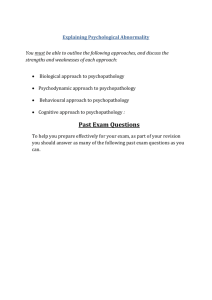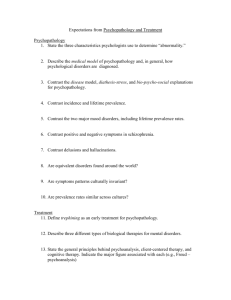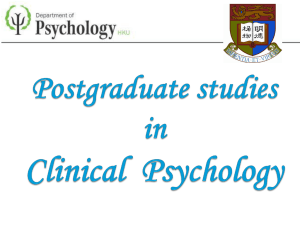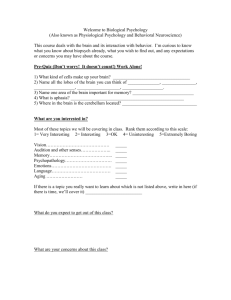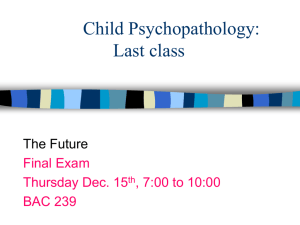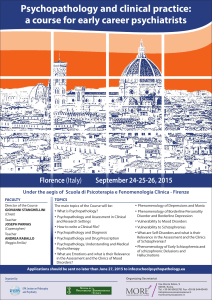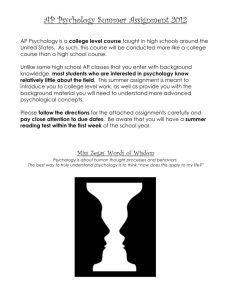Area of Emphasis Description of Area of Emphasis
advertisement
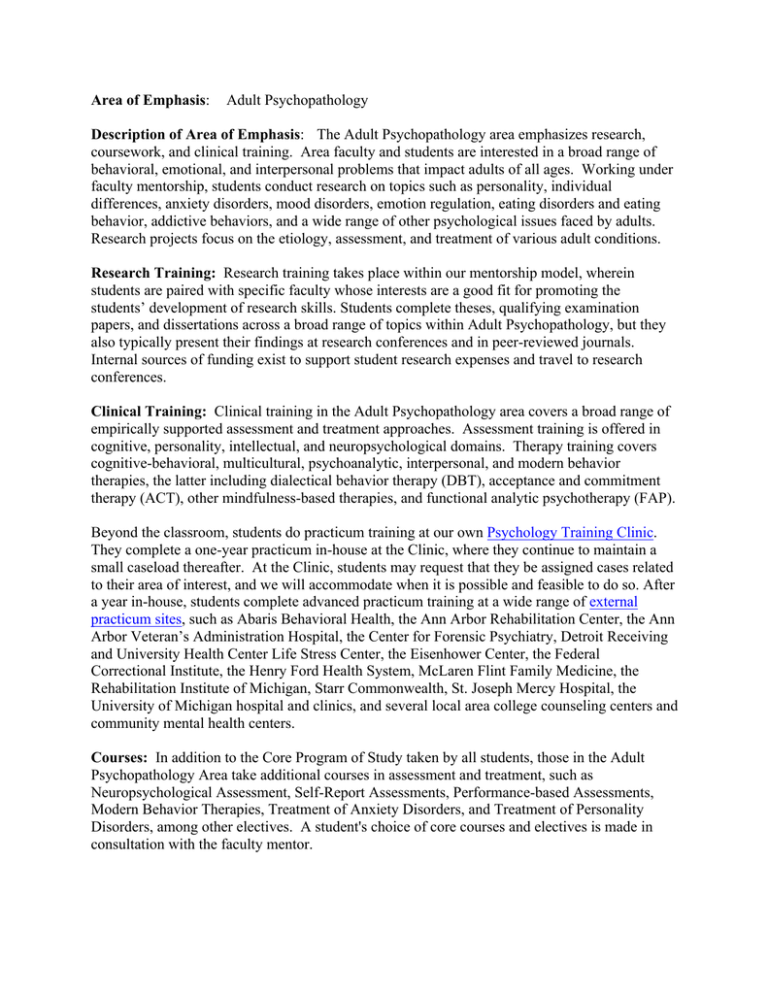
Area of Emphasis: Adult Psychopathology Description of Area of Emphasis: The Adult Psychopathology area emphasizes research, coursework, and clinical training. Area faculty and students are interested in a broad range of behavioral, emotional, and interpersonal problems that impact adults of all ages. Working under faculty mentorship, students conduct research on topics such as personality, individual differences, anxiety disorders, mood disorders, emotion regulation, eating disorders and eating behavior, addictive behaviors, and a wide range of other psychological issues faced by adults. Research projects focus on the etiology, assessment, and treatment of various adult conditions. Research Training: Research training takes place within our mentorship model, wherein students are paired with specific faculty whose interests are a good fit for promoting the students’ development of research skills. Students complete theses, qualifying examination papers, and dissertations across a broad range of topics within Adult Psychopathology, but they also typically present their findings at research conferences and in peer-reviewed journals. Internal sources of funding exist to support student research expenses and travel to research conferences. Clinical Training: Clinical training in the Adult Psychopathology area covers a broad range of empirically supported assessment and treatment approaches. Assessment training is offered in cognitive, personality, intellectual, and neuropsychological domains. Therapy training covers cognitive-behavioral, multicultural, psychoanalytic, interpersonal, and modern behavior therapies, the latter including dialectical behavior therapy (DBT), acceptance and commitment therapy (ACT), other mindfulness-based therapies, and functional analytic psychotherapy (FAP). Beyond the classroom, students do practicum training at our own Psychology Training Clinic. They complete a one-year practicum in-house at the Clinic, where they continue to maintain a small caseload thereafter. At the Clinic, students may request that they be assigned cases related to their area of interest, and we will accommodate when it is possible and feasible to do so. After a year in-house, students complete advanced practicum training at a wide range of external practicum sites, such as Abaris Behavioral Health, the Ann Arbor Rehabilitation Center, the Ann Arbor Veteran’s Administration Hospital, the Center for Forensic Psychiatry, Detroit Receiving and University Health Center Life Stress Center, the Eisenhower Center, the Federal Correctional Institute, the Henry Ford Health System, McLaren Flint Family Medicine, the Rehabilitation Institute of Michigan, Starr Commonwealth, St. Joseph Mercy Hospital, the University of Michigan hospital and clinics, and several local area college counseling centers and community mental health centers. Courses: In addition to the Core Program of Study taken by all students, those in the Adult Psychopathology Area take additional courses in assessment and treatment, such as Neuropsychological Assessment, Self-Report Assessments, Performance-based Assessments, Modern Behavior Therapies, Treatment of Anxiety Disorders, and Treatment of Personality Disorders, among other electives. A student's choice of core courses and electives is made in consultation with the faculty mentor. Affiliated Faculty and Related Interests: Michelle Byrd, Ph.D. (Child Clinical and Health Psychology) – Integration of behavioral and medical care in pediatric healthcare settings, parent training programs, the incorporation of acceptance-based strategies in the treatment of medically ill populations. Norm Gordon, Ph.D. (Adult Psychopathology) – Psychoanalysis, neuropsychology, personality, psychology of film Flora Hoodin, Ph.D. (Health Psychology) – Behavioral medicine and integrated care, particularly the intersection of biomedical parameters with cognitive compromise, depression, anxiety, and behavioral sequelae in adult and pediatricbone marrow/stem cell transplant; Cognitive-Behavioral and modern behavior therapies. Stephen Jefferson, Ph.D. (Adult Psychopathology) – Multicultural and individual differences; stigma, prejudice, and discrimination. Ellen Koch, Ph.D. (Adult Psychopathology and Health Psychology) – Exposure-based treatments for PTSD as well as other anxiety disorders, behavior therapy and cognitive-behavior therapy for adult anxiety disorders, treatment outcome research, anxiety sensitivity and its relationship to other constructs predicting psychopathology, secondary prevention of psychopathology resulting from elevated anxiety sensitivity, and one-session exposure treatment for small animal phobias. Dean Lauterbach, Ph.D. (Adult Psychopathology) – Trauma and PTSD Tamara Loverich, Ph.D. (Adult Psychopathology and Health Psychology) – Emotion regulation, excessive behavior, eating behavior, modern behavior therapies, multicultural therapy. Karen Saules, Ph.D. (Health Psychology) – Addictive behaviors, interaction of addictive and eating behaviors, binge eating, obesity, bariatric surgery, weight management/ maintenance, body image, weight stigma. Tom Waltz, Ph.D. (Adult Psychopathology) – Cognitive and CBT, behavioral activation, behavioral marital therapy, Functional Analytic Psychotherapy, behavior analysis Adjunct Clinical Supervisors: John Deikis Cognitive Processing Therapy, ACT/Mindfulness-based therapies, Motivational Interviewing Melissa Grey Multicultural and feminist therapy Roberta Hitt Interpersonal and cognitive-behavioral therapies for adults and couples Judith Shazer Personality assessment
